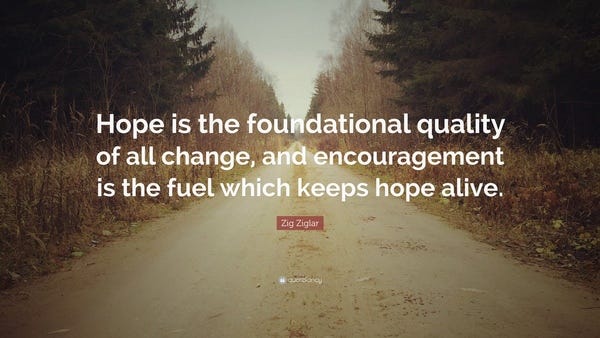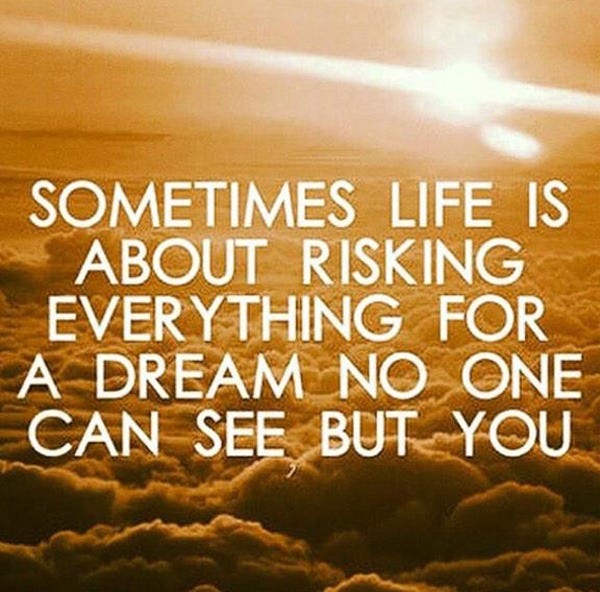Why Hope is the Mother of Positive Change
Reflections on Creating and Recreating Hope in People and Organizations, as a Prerequisite to Meaningful Positive Change
Hello Dear,
The day is drawing to a close, and I am tired, but I do not want to let this day pass without my hitting publish. At the same time, I would not like to just write out something and request your kind indulgence and precious attention to it.
You know, one of the books I am now reading is a book gifted to me by my wife (it is a rare gift for me from my wife, since she says I buy a lot of books in any case!). And yes, as with most things in life, I find her choice to be very fitting and good. The book is The Power Of Humility: How Humble High Achievers Are Rewriting the Rules of Leadership by PV Ramana Murthy.
The Relationship between Humility and Self-Awareness
Yes, I believe almost all of us can perhaps benefit from a little more humility. An interesting question arises here: suppose someone believes that he or she does not need to be humbler, what does it say about them? Does it invariably mean they are conceited, or is it possible that the person is a sage, an enlightened soul, who really is humble?!
Let me share with you the answers I had to this question, way back in 1999 (I remember sharing this with my then-best-friend at school). I had then identified four levels of pride.
The worst state, where we are proud and are not even aware of our pride
Here, we are proud, but we understand we are proud, but then, this does not make much of a dent
This is a good state, where we are humble but do not as yet know we are humble!
This is the best state to be in, since we are both humble and aware of our humility
I had regarded the fourth state of being to be better than the third, since the third state implies significant gaps in self-knowledge, which I theorized would be dispelled by humility.
Looking back now, I do realize that the above four-state model is indeed an oversimplification. Also, I think the dichotomy I introduced between the third and fourth states was perhaps a false one; here is why I think so.
It’s not just about how humble one is or has become, and how well one is aware of it. What is more important is how well we know how much more humble we must be and can be and become! Or put differently, what is more important is to know how little we know as to how much more humble we can and must be and become.
Yes, if we think we have become humble enough and cannot and need not be or become humbler, that itself might be a very dangerous form of conceit to be afflicted with.
So, humility is important, very important. It might very well be the most important virtue as well, it being foundational to every other virtue. However, today’s post was not intended to be about humility. It is rather about something else which is essential to life: hope!
A Calling to Gift Hope
Ramana Murthy reminds us that one of the attributes of humble leaders is that they are path-showing; they show others the correct way forward. They seek to bequeath a legacy. They look at opportunities as transformational rather than transactional.
Murthy further tells us that his study has shown that one attitudinal characteristic of path-showing leaders is that they are full of hope all the time, anticipating positive outcomes when it comes to their followers. He says that the humble leaders’ relentless search for what is right for the organization and their people leads them to consider various possibilities and identify diverse opportunities. This in turn builds hope in the leaders, which gets passed on to the followers all the time.
Quoting a transformational Indian corporate leader, Ramana Murthy shares one crucial aspect of the calling of leadership.
“The task of leadership is to give hope.”
It has indeed been rejuvenating and revitalizing for me to read this, not least because I have been inspired by some of the same set of beliefs, on the relationship between leading and creating and nurturing hope. After all, what is life without hope? (Well, a book I came across recently, which could be at least partly contrarian to the above idea is The Courage of Hopelessness).
And I realize that this theme has been reverberating in quite a few of my writings over the years. So, for today, let me share with you a piece of reflection I wrote on the topic, in January 2022.
[Given below is a piece of reflection I wrote, in January 2022]
The Recreation of Hope
Can things be any different than they are now? Why will the situation improve? After all, there are so many challenges, so many people who need to collaborate in order to get anything moving. Why should I trust these people - who are used to making only grand statements with hardly anything to show for it? Indeed, it is better that we just keep going along the same track we have been on; why should I risk my time and effort and become a fool again? I am content where I am.
I believe these thoughts would be all too familiar for you. We ourselves would have given this advice or one of its variants a thousand times, either to others or subconsciously to our own selves, either in words or by our actions.
In my humble reflections and small attempts (mostly unsuccessful) at bringing in organizational change, this is one thing which strikes me. Why most change efforts do not even take off. Why they are nipped in the bud. Or rather, why they do not even get conceived. Why? Because of the simple and sheer absence of the very hope, the very faith and belief, that any meaningful change is possible. Or likely.
Due to the absence of the hope that any positive change can or will happen, we end up choosing the easy, effortless, appealing and comfortable path of least resistance, least action, least energy. Indeed, we tell ourselves that this is the logical, rational and even wise choice. We find prudence in our actions, reminding ourselves that this is indeed the best allocation of our finite time and energy.
And these thoughts are indeed self-reinforcing and self-fulfilling. Over time, we get programmed into thinking these thoughts, in viewing everything with more suspicion and less faith than the particular situations warrant.
Moreover, our fears are contagious as well, quite like an infectious disease. When we think change is not likely to happen and act accordingly, others too tend to think and act so, which in turn makes us more confident in the correctness of our assesssment and the wisdom of our judgement.
This is why I believe that anyone aspiring to bring in meaningful change in organizations needs to work simultaneously on the important endeavour of recreating hope in the present and the future. We should take conscious efforts to nurture and cultivate organization-wide curiosity and excitement for discovering and creating the possibilties the future presents. We should have frequent and open deliberations on the fundamental issues we face, so that we identify issues and take participative and concerted efforts to navigate and solve them. We should develop a shared point of view on our shared condition, so that everyone’s efforts are coordinated and steered in the right direction, in the attainment of the greater cause we seek to serve.
And above all, we should encourage and inspire people to fail, to make mistakes, to celebrate the small yet meaningful victories, and give ourselves and others the assurance, inspiration and confidence to make a break from the past, to not use the past as the only guide to the future. Yes, we should realize and remind ourselves and others that to get different results, we need to keep persevering, to make a leap of faith. After all, the greatest risk is not to risk anything. And that is a risk we cannot afford to take. Isn’t it?
"The greatest risk in life is to risk nothing...only the person who risks is truly free"
(Source: https://jwjonline.net/risks)
Question: What can we do to inspire ourselves and others to be more hopeful about the present and the future? To not be prisoners of our past thoughts, actions and behaviours?
Please do let me know. And I suggest you read this piece too.
Thank you for your time and attention!
[End of the piece of reflection I wrote, in January 2022]
That is it for today’s reflections, dear. How effective are we in kindling hope in the people and institutions of our lives, in enabling and inspiring them to spot new possibilities, in learning to hope, and moreover, in living and thus earning the reason to hope, even against all hope?
Hope you are able to find some sense in these reflections? Or are they hopeless?😉🙂In any case, I hope to improve, and hope to add more value to you in the days and weeks to come. Thank you for your kind attention! - Dheep.






